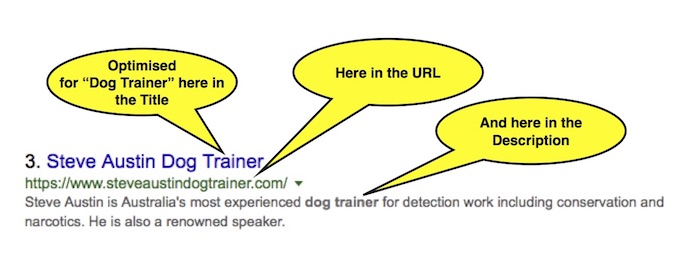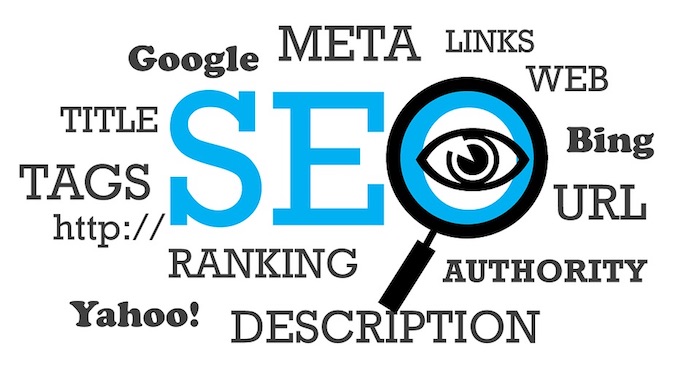How to Improve Your Website Ranking… and Why It Matters
Does your website appear on Page 1 when you do a Google search? No?
Well it should… at least if you want traffic to your site.
We All Want Our Problems Solved – NOW!
Consider how you use search engines like Google. (I’ll use Google as a generic term to represent all search engines).
You jump onto Google, looking for an answer to your problem. You type in a few words. A list appears and you scan through them… hoping to find the answer to your problem.
How often do you look past Page 1? Ever?
I don’t, unless I’m searching for something really obscure.
Let’s face it, we’re all busy and we want our problem solved immediately. We simply don’t have time to search through dozens of websites, looking for the “perfect” answer.
So if your website isn’t on Page 1, how many people are going to know your site even exists? All of the time, effort and money spent on creating and developing your website is wasted.
With over a billion websites out there, you need your website to stand out from the crowd. But how?
A Few Simple Rules
Let’s go back to basics. The Internet is full of information… and mis-information.
Countless amazing stories exist about how someone became an overnight success, using their incredible magic marketing formula. There is so much information, and often the basics get lost in the hype.
So let’s cut through the hype and get-rich-quick schemes. What are the time-honoured techniques that work… the basic rules for a good website? (Notice I haven’t asked, “What are the tricks to get my website ranking on Page 1 of a Google search?” More on this later).
Rule #1. Solve your visitors’ problems.
When you do a Google search, you’re looking for an answer to a problem. And when you click on a website, you expect an answer… immediately. If this site doesn’t solve your problem, you click the “back” button and move onto the next search result.
Make sure you solve your visitors’ problems. If you don’t, they’ll leave… and not return.
How do you achieve this? That’s an entire topic on its own. Learn how to solve your web site visitors’ problems here.
Rule #2. Provide high quality content.
This is critical. There’s an old saying, “content is king”. And it’s true.
Nothing beats high quality content. If your site is well written, then you’re way ahead of your competition already. Please your visitors and they’ll likely return time and again… and share links to your site, since your content is so useful and easy to understand.
Again, high quality content is absolutely critical – both for your visitors and for Google to look at your site and think, “Hey, this is great. I’ll rank this higher”. For a more in-depth discussion on why high quality web content matters, go here.
Rule #3. Make it easy for visitors to navigate.
How many sites have you seen that are incredibly confusing?
You know the ones. You click a button in the top left corner on the first page. But on the next page, that button doesn’t exist. Or links to other pages are different colours between pages… or you follow a few links then find there’s no obvious way to get back to the Home page… or there is no Home page at all.
You must make your site easy to navigate. How? Go here to read more.
.
Rule #4. Help visitors understand what each page is about when they do a Google search.
When you do a Google search, you’ll notice a few things. Every listing has a certain format. There’s a title, then a website address, then a description. Think about what you’re looking at.
You’re looking at an ad… a mini-ad for that page.
The title and description are so often overlooked. They are critical.
Why? Well, when you do a search and the list appears, do you always click on the number 1 listing? Or do you quickly scan down the listings, to see what catches your eye?
If you’re like most people, you’d do a quick scan. Just because a listing is ranked higher doesn’t mean more people will click through to it. It has to catch peoples’ attention, simple as that.
And how do you capture peoples’ attention? By using your title and description to create a mini-ad for your page.
This doesn’t mean it should be full of hype and bluster. Low-key, conversational, clear and easy to read gets my attention. Oh, and persuasive of course.
Many website owners have no idea where the title and description originate from, much less the importance of optimising them. And that’s okay, you’re not expected to know everything. But you really need to know this.
Rule #5. Optimise your site for the search engines.
Notice how the words you entered into a search engine are highlighted on the listings? For example, you might enter “dog trainer” and every occurrence of “dog” and “trainer” is highlighted in bold text.
Now if a page is optimised for the search engines, this is known as SEO, or search engine optimisation. You’ll probably see the phrase “dog trainer” in the title, website address (eg https://sitename.com/professional-dog-training/) and description.

Google will recognise that the page about dog training is optimised and rank it accordingly. Not only that, Google knows exactly what the page is about. So when someone searches for “dog trainer”, the page about dog training will be listed on the search page.
Of course, there are many other criteria you’ll need to satisfy before Google decides your page is worthy of their attention.
Your Takeaway
Notice I asked earlier, “What are… the basic rules for a good website?”
I didn’t ask, “How do I get my website ranking on Page 1?” Why?
It’s quite simple. You must build the foundations before you even consider building the house.
Think “what’s in it for them”. Provide valuable content… useful information that educates and helps your visitors, solves their problems.
Make your website the best experience it can possibly be for your visitors. Then add in a series of minor yet critical elements to get your website in front of the search engines… and your customers.
If you’d like your website to rank higher in search engines, I can help you. Go here to contact me about reviewing your website.
Andrew Murray

